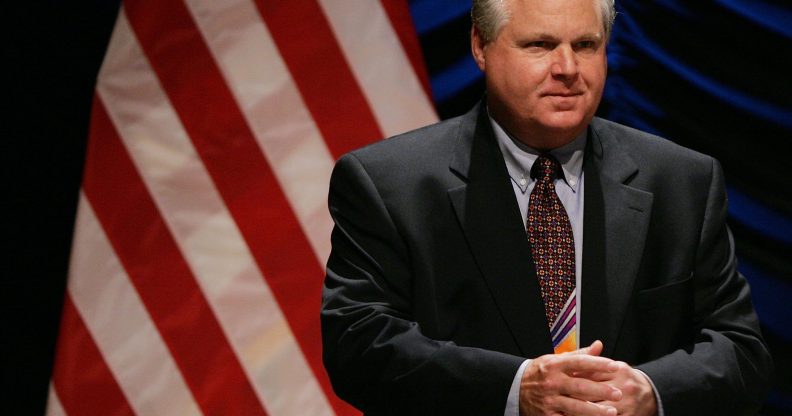Furiously anti-LGBT+ radio host Rush Limbaugh dies, aged 70

Radio personality Rush Limbaugh has died aged 70. (Win McNamee/Getty)
Conservative radio host Rush Limbaugh has died aged 70, his wife announced on his show on Wednesday.
The staunchly anti-LGBT+ commentator had made a name for himself with his barbed remarks about queer people on The Rush Limbaugh Show.
Announcing his death, Limbaugh’s wife Kathryn said: “Losing a loved one is terribly difficult, even more so when that loved one is larger than life. Rush will forever be the greatest of all time.”
Limbaugh was diagnosed with terminal lung cancer in January 2020, just days before he was awarded the Presidential Medal of Freedom by Donald Trump.
Over the course of a career that spanned decades, Limbaugh repeatedly courted controversy with his comments about various minority groups, including Black people and LGBT+ people.
He will be best remembered by many queer people as the man who repeatedly hit out at their community, from leading political figures like Pete Buttigieg to offensive remarks about gay sex.
Limbaugh pushed anti-LGBT+ views from early on in his career, and the AIDS crisis proved fertile ground for the controversial radio host to find an audience.
He famously referred to AIDS as “the Rock Hudson disease” following the actor’s high-profile death. In the 1980s, he briefly ran a segment called the “AIDS Update”, which was often introduced with the song “I’ll Never Love This Way Again” by Dionne Warwick.
He later apologised, saying the segment had “missed the mark” and ended up being “very insensitive to people who were dying” – but the apology only went so far for the queer people who had lost loved ones to the disease that was sweeping through their community.
In 2007, Limbaugh defended Ronald Reagan’s response to the AIDS epidemic, and baselessly claimed that the virus did not spread to straight people, despite the fact that huge numbers of straight people have died from the disease across the world.
Rush Limbaugh became obsessed with Pete Buttigieg kissing his husband
In 2013, Limbaugh found himself on the wrong side of the LGBT+ community once again when he compared efforts to legalise same-sex marriage to paedophilia.
He said: “They want us to all think that paedophilia is just another sexual orientation. You know who’s gonna fall right in line is college kids, just like they have on gay marriage, just like they do on all other revolutionary social issues.”
In 2015, he criticised “militant gay activists” for targeting bakeries, and he made headlines once more in 2017 when he hit out at the Oscars for giving the Best Picture award to Moonlight, a critically-acclaimed coming-of-age story about a gay Black man.
In a shocking radio segment, Limbaugh suggested that the Academy Awards might have given the top award to Moonlight because they were afraid of “potential violence” if they didn’t.
As the years rolled on, Limbaugh always ensured he stayed in the spotlight for his often bizarre commentary. In 2020, when Pete Buttigieg was seeking the Democratic nomination for the presidency, Limbaugh became increasingly disgruntled as the candidate kissed his husband Chasten at an event.
In a bizarre rant, Limbaugh claimed that Buttigieg kissing his husband would cause “problems” for parents, and lambasted the Democrat for kissing his husband “frequently”.
He later suggested that Buttigieg kissing his husband would look bad next to “Mr Man Donal Trump”, suggesting that being queer would diminish the presidential candidate.
His final year on air was marked by the coronavirus pandemic, which resulted in widescale lockdowns and quarantine measures designed to stop the disease from spreading – but even then, Limbaugh was sceptical. He insisted that the virus, which has killed more than a million people worldwide, was no more than a common cold in February 2020, and said the pandemic was being “weaponised” to bring down Trump.
Limbaugh leaves behind him a divisive legacy, with conservatives lining up to praise the radio personality. Fox News described him in an obituary as “beloved” and “influential”, while others have taken a more critical approach.

